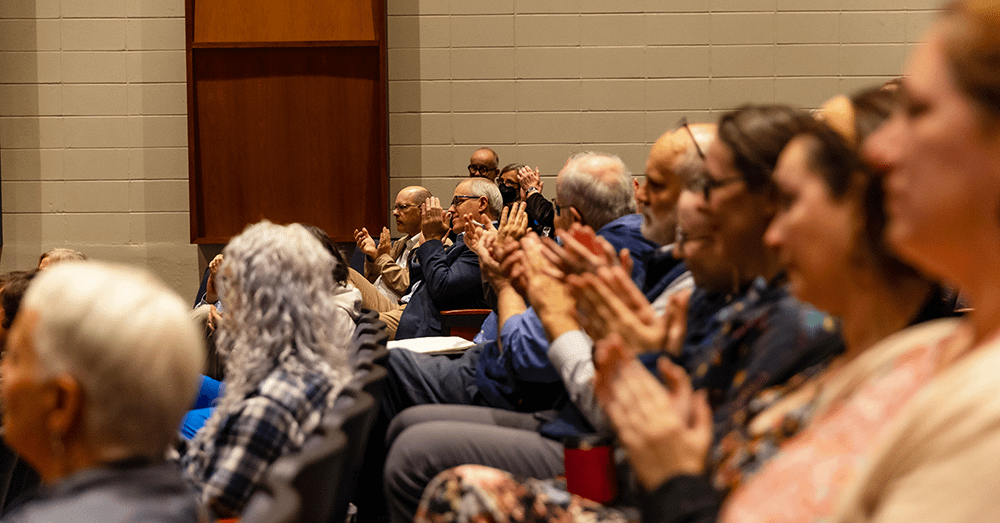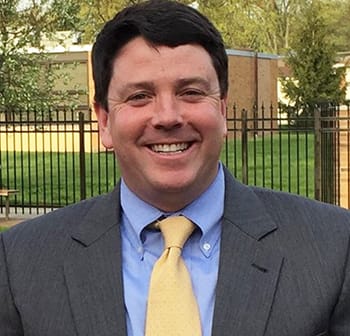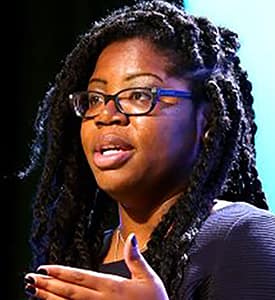French priest tells of seeking Holocaust mass graves
The Roy Room in Dion Student Center swelled with Saint Michael’s community members for the 37th annual Rabbi Wall Lecture series. Rev. Patrick Desbois, a French Catholic priest, was the honorary speaker. Having started a foundation that has located tens of thousands of unmarked graves created by the Nazi death squads, he lectured on “The Holocaust by Bullets: A Priest’s Journey to Uncover the Truth Behind the Murder of 1.5 Million Jews.”
Every year Saint Michael’s brings speakers who can speak to interfaith dialogues in honor of Rabbi Max Wall, the first Jewish professor at the college in 1964. Rabbi Wall, among the first U.S. military chaplains to come upon Nazi concentration camps as a World War II veteran, later opened up interfaith dialogues within the College and across Vermont and New England through his work.
Professor Herb Kessel of the economics faculty, who is on the lecture series committee, said he was excited to introduce this year’s speaker given how closely Father Desbois’ life work and moral values aligned with those of the late Rabbi Wall, who died in 2009, and whose daughters were in the audience alongside rabbis from the major Jewish congregations in Burlington and South Burlington.
Earlier in the day, Fr. Desbois had lunch with the Edmundite community, and after his talk he joined a dinner in Dion presented by the President’s Office, with many leaders of the local and college Jewish communities and religious studies faculty as guests.
The speaker started his 6 p.m. talk by explaining why he would take interest in this subject: Desbois was close with his grandfather, who had been deported to a Nazi prison camp but never talked with his grandson about it. It wasn’t until 2002 when Desbois visited Rava-Ruska, the camp where his grandfather was imprisoned, that he realized the scope and the impact of what his grandfather had seen. His grandfather had seen some of the tens of thousands of Jews, Gypsies and other Holocaust victims shot and buried in mass graves.
Desbois was inspired to help the families of those murdered find peace all these years later. He started a group called “Yahad–In Unum,” which means “together” in Latin and Hebrew, and the group set out to find the thousands of mass graves in the former Soviet Union that still hold millions of people. Twice during the program he showed disturbing though well-reported and absorbing clips from a recent “60 Minutes” report about his efforts.
The graves he investigates are undocumented, and oftentimes people in the villages deny it took place, said Desbois. He and his team have conducted thousands of interviews, searched with metal detectors and looked through as much information as they could find to locate 17,000 mass graves so far. He said a major factor motivating this work is to give relief to the families who write to his foundation wondering about where their grandparents and other relatives are buried.
“I don’t do this to find millions,” he said in answer to a question about whether he has caused experts to expand their estimates on Holocaust deaths, explaining that the primary focus for his work was giving individual families closure. “We reconnect with the families and they make memorials,” he said.
The priest’s talk also challenged the audience to think about the fuller scope of genocide in World War II as perpetrated even beyond the better known death camps like Auschwitz, at many largely unknown or unmarked sites of mass shootings and graves like those he has been investigating. He has made it his mission to find as many mass shooting sites possible to remember all of those lost in the Holocaust, he said.
“Genocide is a disease,” Desbois said, noting that such atrocities have been happening again and again even since the Holocaust — in Rwanda, Bosnia, Cambodia, and now in Syria and Iraq due to ISIS. His latest mission is to help spread the word of the genocide of the Yazidis, who have been killed by ISIS invaders, and he has been to Iraq several times as part of that work.
Desbois even said that a colleague once suggested that Hitler’s greatest mistake was to make the camps, because people could come back from those to tell their stories, but no one ever came back from the forests or outskirts of towns, where most of these unmarked graves that he has been finding are located.
After his formal remarks but before questions, he told about objections he once heard on the disturbing nature of his very graphic Holocaust stories during his talks, from a woman who said it was making it hard for her to sleep. He suggested to her that it was “perhaps the beginning of conscience” for her – and in that context, he told his Saint Michael’s audience, “I wish you a bad night.”
“We can’t build the world on mass graves,” Desbois said, arguing that allowing the current genocide and other genocides to go by forgotten due to unmarked graves will only distance people from this evil and allow them to forget. Finding the unmarked graves allows Desbois to remind the world to never forget, he said.
“Don’t forget you are a human being,” he said. “God will ask you, at the end of your life, the first question of the Bible [from the story of Cain and Abel, as he had related earlier]: “Where is your brother?”





